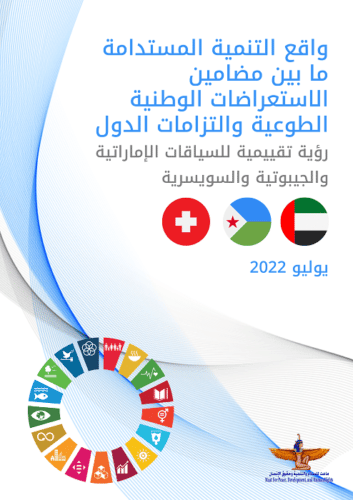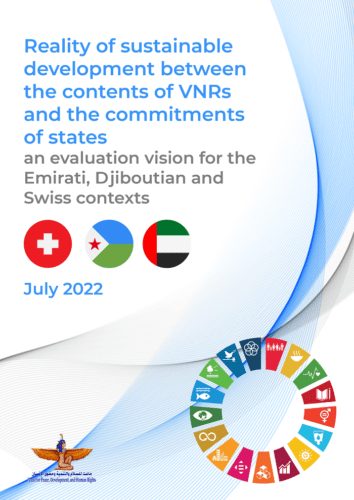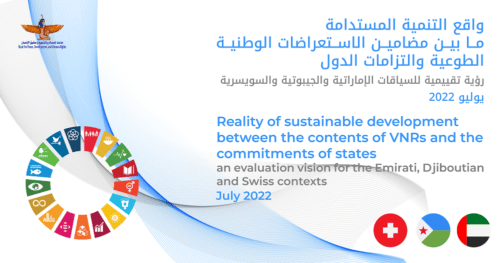Okeil: We call on the governments of countries to raise awareness of the importance of the VNRs of sustainable development and its role in advancing development
Said Gharib: We recommend Djibouti to promote smart water management mechanisms by adopting and hydroponics smart irrigation technologies
Coinciding with the conclusion of the agenda of the High-Level Political Forum 2022, which is being held from July 5 to July 15 in New York under the theme “Building back better from the coronavirus disease (COVID-19) while advancing the full implementation of the 2030 Agenda for Sustainable Development”, Maat for Peace, Development and Human Rights presents this evaluative paper under the title "Sustainable Development between the Contents of the Reviews and the Commitments of States: An Evaluative Vision of the Emirati, Djiboutian, and Swiss Contexts". This paper highlights what the VNRs and HLPF are, analyzes the VNRs of the United Arab Emirates, Djibouti, and Switzerland by reviewing the successes and challenges and concludes with a set of recommendations about them.
The study confirmed, through its evaluative analysis of the VNRs of the United Arab Emirates in 2022, that the government has made institutional and participatory arrangements with stakeholders on sustainable development, similar to the formation of the National Committee for Sustainable Development Goals in 2017 from 17 federal government institutions to follow-up on development goals annually. It adopts techniques and initiatives to support the social, environmental and economic sectors at the national level, including Expo 2020. Despite the UAE's development policies and efforts to preserve the environment, it is facing increasing environmental challenges resulting from the growing population growth and demand for water and urbanization, and the efforts of economic development. At the top of these challenges is the increase of carbon dioxide emissions to the degree that the UAE has become one of the largest carbon footprints in the world as well as the growing rates of waste and desertification.
As for Djibouti, the study explained that the government includes five-year plans, such as the Accelerated Growth and Employment Strategy from 2015 to 2019, the Integration and Institutions Strategy for the period from 2020 to 2024, and the National Program of Action for Biodiversity. Among the challenges that impede its development policy are the poor infrastructure and the lack of specialized medical personnel. Djibouti is also at the forefront of countries most vulnerable to climate changes, especially droughts and devastating floods. In 2018, it was exposed to the hot tropical cyclone storm Sagar, which affected 150,000 people, in addition to the rise in water-related challenges such as the lack of freshwater and high cloud rate.
Finally, the study evaluated the VNRs of the voluntary national review of Switzerland and indicated that Switzerland and its policies are committed to the 2030 development vision, as it defined the development priorities and mechanisms for their national implementation every 4 years. This, in addition to the Swiss efforts to integrate sustainability policies into sectoral policies, especially with regard to goals related to consumption, production, energy, climate, urban development, natural resources, economic and financial system, education, research and innovation, social security and gender equality. The federal offices also obligate government to include sustainable development in their periodic reports on business in order to measure contributions to the sustainable development goals.
For his part, Ayman Okeil, a human rights expert and the president of Maat, pointed out that the governments of countries must fulfill their voluntary obligations regarding the review and follow-up of the sustainable development goals within the framework of the United Nations Development Vision 2030, by raising the preparatory capacities for the review process in its various stages based on the national reviews guide and relevant guidelines and increasing the necessary resources Updating as well as reforming the institutional and legislative structure and the monitoring and reporting systems.
Okeil also called on the governments of countries to raise citizens’ awareness of the importance of the national review of sustainable development and its role in promoting development, through the processes of reviewing, following up and evaluating the implementation of the sustainable development goals. He also recommended the effective engagement of the private sector, civil society and actors in preparing and submitting review reports to the HLPF and implementing its main recommendations and messages.
Said Gharib, a researcher at the Sustainable Development Unit at Maat, recommended the government of Djibouti to make more efforts to address the challenges of sustainable development related to climate change, health, and education. In terms of climate challenges, he suggested that climate policies must be reviewed and updated to prohibit deforestation and encourage rationalization of consumption, localization of water sustainability technology, modernization of the infrastructure related to sanitation services, and promotion of smart water management mechanisms by adopting and hydroponics smart irrigation technologies.

 |
 |











